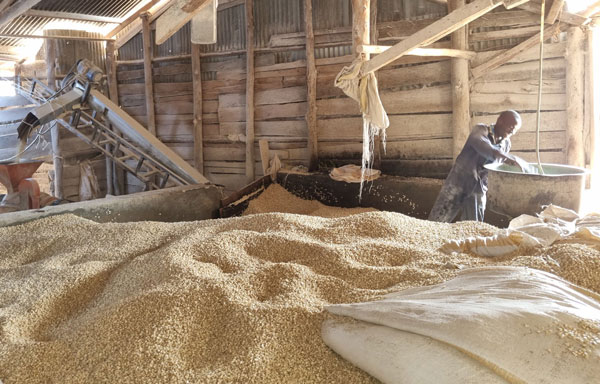
Kampala, Uganda | THE INDEPENDENT | The Danish government has, through the Danish Development Agency (DANIDA), together with other organisations in Uganda and Denmark launched the Integrated Grain Handling Project for rural communities to help farmers improve standards.
This follows recent incidents regarding the quality of grain, mainly maize. The Office of the Prime Minister rejected some maize supplies that were to provide COVID-19 relief, and this was followed by South Sudan and Kenya also halting supplies from Uganda.
Other findings showed several school food stores had huge concentrations of aflatoxins, a poisonous substance produced by certain fungi found on crops such as maize, and which thrives in dump or moist conditions.
The Integrated Grain Handling Project has been designed to address some of the challenges in the grain value chain, targeting farmer yields, post-harvest quality of grain, and improving livelihoods through access to quality and value markets.
The Ambassador of Denmark to Uganda, Signe Winding Albjerg, says the climate unpredictability is also becoming a big challenge to post-harvest handling for Ugandan farmers as sometimes dry weather suddenly turns into rain, affecting the drying grain. The ambassador says that the program is also a response to this challenge.
The Integrated Grain Handling Project will enable the supply and installation of post-harvest cleaning and drying, whole grain milling, and seed cleaning equipment, with a capacity of 6.5 to 40 metric tonnes per day, courtesy of BM Silo, depending on the availability of financing.
Henrik Anker-Lagefoged, Regional Director, Access2Innovation, says the storing and drying facilities established at Kakiri and now owned by Wekembe Cooperative Society, were informed by the inability of the the farmers to supply clean grain.
He also said the farmers were earning very little compared to the traders or middlemen who got the grain from the farmers and sold it to the organizations.
The Program, a brainchild of “Access2innovation”, a Danish platform for innovative, sustainable, commercial solutions to the African emerging markets, is also supported by BM Silo, Engsko, and Buurholt, all of Denmark, and two Ugandan partners; Ag Ploutus and Opportunity International.
The desire of the project is to have the facilities spread all over the country’s grain-producing countries, but, according to DANIDA, the farmers, even cooperatives can hardly afford the costs. This is the reason that they are partnering with financial institutions to connect the farmer cooperatives to the lenders, on top of providing training and access to markets and inputs, according to Anker-Lagefoged.
Humphrey Mutaasa, the Chief Technical Advisor at the Grain Council of Uganda, called for more involvement by the government including regulation of the sector, to supplement to efforts of the private sector and developing partners.
Hailing DANIDA and the others for the post-harvest handling system, Mutaasa said the farmers sell off wet grain because sometimes there is little time between the dry harvesting season and the rainy planting season. He, however, said the government had neglected the duty of regulating the agriculture sector which had also allowed grain buyers, including foreigners, to buy produce right from the garden, hence affecting standards.
Mutaasa says in the rural areas, small-scale and appropriate technology agricultural systems are needed, to cater to the smallholder farmers, while cooperatives can be empowered to acquire bigger ones. He says the idea behind the DANIDA partnership is to enable rural farmers to access better drying and handling facilities, which will in the end help the country’s quality products for both local and export markets.
*****
URN
 The Independent Uganda: You get the Truth we Pay the Price
The Independent Uganda: You get the Truth we Pay the Price



